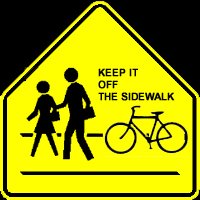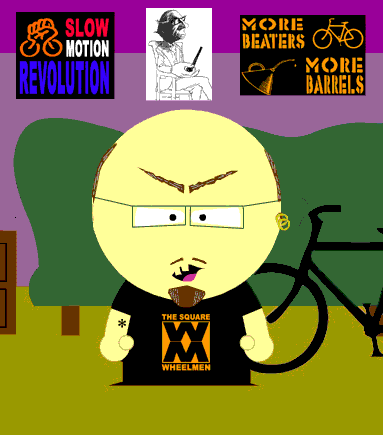When I was a child...
I biked as a child
 Last Saturday, Rob O'Flanagan, a columnist for Canada's GuelphMercury, wrote Why bike laws fail so abysmally. It poses the theory that they way we bike as kids is the way we bike as adults. Although I agree with his conclusion I think there's more than childhood nostalgia at work here. Biking, like caging in the US, is suffused with a passionate sense of freedom. Below is his piece with more of my reactions.
Last Saturday, Rob O'Flanagan, a columnist for Canada's GuelphMercury, wrote Why bike laws fail so abysmally. It poses the theory that they way we bike as kids is the way we bike as adults. Although I agree with his conclusion I think there's more than childhood nostalgia at work here. Biking, like caging in the US, is suffused with a passionate sense of freedom. Below is his piece with more of my reactions.Certainly, the ultimate success of bikes as a popular form of alternative form of transportation will depend on getting folks on bikes when they're young.I have a theory on why it's so hard to enforce bicycle laws, and why it seems nearly impossible to change cycling habits. The theory may extend to all manner of things related to what we learn as children and find hard to unlearn as adults.
Every now and then police officers make an effort to crack down on cyclists who pedal on sidewalks or break other bike laws. But there is a futility to the effort because of the embedded cultural reality of the bicycle in Canada.I've always wondered if the often sporadic enforcement of bike offenses by Chicago's Finest is due mostly to the the large number of bikers compared to the relatively small number of officers. Also, as many of my bike buds like to say, "Don't they have more serious offenses to cite?"
I totally agree, especially since in my neighborhood most pedestrians are older folks.It looks kind of silly for anyone other than a child to ride their bike on the sidewalk, or to fluidly flow from street to sidewalk as though they were one seamless two-wheel thoroughfare. But you see big people do it often. I'll admit I sometimes get the impulse to bodycheck sidewalk riders, but I resist the urge.
This childhood nostalgia is certainly reinforced by the Bikes Are Toys marketing major US manufacturers introduced after WWII. Besides, anyone who's regularly participated in a Critical Mass, or observed one, would've noticed the widespread attitude that you can bike anywhere anytime.The reason this fluidity exists is because most of us learn to ride bikes when we are kids -- when the sidewalk, the park, the train tracks, the parking lot, the riverbank and all other accessible pathways were travelled at will. Biking was strictly a form of recreation, with very little utility attached, unlike in other cultures where the bike is an indispensable means of transportation, even a means of livelihood. That was the beauty of riding a bike as a kid -- your route was unlimited. A bike was a tool of the imagination more than an object of practicality. That was the beauty of riding a bike as a kid -- your route was unlimited. A bike was a tool of the imagination more than an object of practicality.
I too grew up in mostly rural areas where traffic was at a minimum. In fact, I didn't own a helmet until I move here to The Windy City over a decade ago when I was in my mid-40s.I grew up on a farm, so most of my biking was restricted to dirt roads and fields. But taking my banana bike to town was a massive adventure because so much more territory could be covered on two wheels than two feet, and the energy and excitement of that exploration had a way of expanding the scope of possible routes and destinations. My gang of friends and I biked everywhere -- graveyard, schoolyard, gravel pit, hospital grounds and playgrounds -- up onto sidewalks, blasting across streets, riding on the wrong side of the road, bobbing and weaving through traffic. All at the highest possible speeds our legs could take us.
A bike wasn't a bike after all. It was a motorcycle, a racing car or a spacecraft. The rider was Evel Knievel, popping wheelies, jumping gorges. Or Mario Andretti competing in the Indianapolis 500. Or a space traveller hovering over the surface of the moon. Then the controlling hands of civil society reached in to reshape the imagination and impose order. All those biking habits we learned as kids were to be abandoned. Riding on the sidewalk was branded a perilous thing, injurious, even life-threatening. And, most importantly, it is disorderly and therefore must be stopped.
 Now, young and older adult bikers are divided into playful sub-cultures: freakbikers, tweedriders, full moon cruisers, midnight marauders, etc. This, I think, is a serious response to our dominant WASPY culture that scolds adults with I Corinthians, Chapter III, Verse 11: When I was a child I spoke as a child, I understood as a child, I thought as a child; but when I became a man I put away childish things.
Now, young and older adult bikers are divided into playful sub-cultures: freakbikers, tweedriders, full moon cruisers, midnight marauders, etc. This, I think, is a serious response to our dominant WASPY culture that scolds adults with I Corinthians, Chapter III, Verse 11: When I was a child I spoke as a child, I understood as a child, I thought as a child; but when I became a man I put away childish things.If we actually rode bikes for utility -- as a carrier of market vegetables or hauler of scrap metal, as they do in a nation like China -- we might take the laws of the road more seriously. We might see the bike as more than a plaything. But a bike is largely a tool of fun, and it just isn't much fun sticking to bike lanes, hugging the curb hoping a car doesn't side-swipe you. The child inside wants unconstrained riding, wants to find his or her own path.
 Having biked in Beijing several years back, I would say that utility, though a big one, isn't the one reason why the Chinese take bike laws more seriously. The number of bikers there probably dwarfs that of all the Western countries combined. If our our free-wheelin' style were to be adopted it would surely lead to chaos. Besides, bikers are more prone to follow the law because way more cops ride bikes there than in the US and being representatives of an authoritarian, one-party state, they definitely get more respect.
Having biked in Beijing several years back, I would say that utility, though a big one, isn't the one reason why the Chinese take bike laws more seriously. The number of bikers there probably dwarfs that of all the Western countries combined. If our our free-wheelin' style were to be adopted it would surely lead to chaos. Besides, bikers are more prone to follow the law because way more cops ride bikes there than in the US and being representatives of an authoritarian, one-party state, they definitely get more respect.Labels: pensées, rolling abroad, velotariat







2 Comments:
Fantastic post! You were looking dapper on the evening ride on "Lets go ride a Bike" earlier this week too
Fat Lad
Thanks! Non-lycra events are certainly taking off!
Post a Comment
<< Home